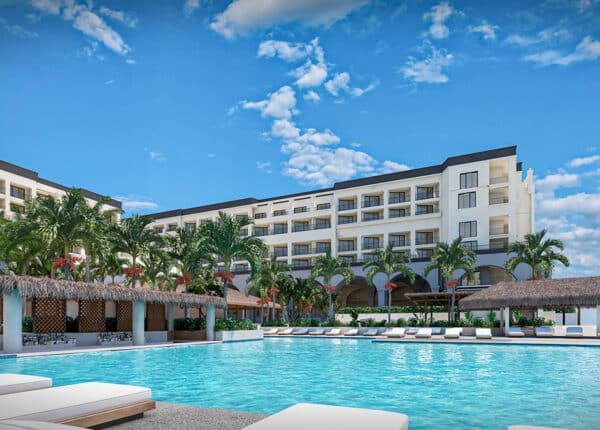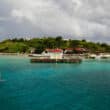De-risking: Between Rock and Hard Place in the Caribbean
By Andrew Enriquez
Op-Ed Contributor
The correspondent banking system in Latin America and the Caribbean has recently been facing increasing pressure, so much so that institutions like the World Bank and the Financial Action Task Force (FATF) have issued consultative reports on the brewing crisis in these emerging markets.
Because much of the world’s cross-border capital flows are in US dollars, most Caribbean banks maintain what are called “correspondent accounts” in American banks.
This allows them to exchange U.S dollars and handle other financial transactions in the United States. Without the accounts these banks would have limited access to foreign financial markets, thus severely hampering their ability to service client accounts without opening up a branch in the States.
In the immediate aftermath of the September 11, 2001 terrorist attacks, correspondent banking relationships came under heightened congressional scrutiny. Shortly thereafter several US banks reported special restrictions including the monitoring of all transactions involving Antigua and Barbuda, and Belize.
A decade and a half later, Belize and Antigua, among other territories are again being perceived as high-risk jurisdictions. Consequently, tier one banks like J.P. Morgan Chase, Bank Of America and Citigroup have been severing correspondent-banking relationships with whole categories of customers in the region including domestic banks, charities, diplomatic accounts, money services business (MSB) and even a few central banks .
Such moves are consistent with a broader shift across the industry, in which international banks are indiscriminately restricting, terminating or denying services to supposedly risky customers from jurisdictions deemed to be high risk. This is especially applied in cases where the business returns do not justify the investment needed to manage the risk brought on by higher compliance cost, unprecedented penalties, vague legal standards and escalating litigation cost. The most common cause of this phenomenon known as “de-risking” is the increasing cost of regulatory compliance, especially in relation to the Anti-Money Laundering and Counter Financing Terrorism (AML/CFT) regulation.
The wholesale exiting of these business lines is particularly acute in Belize and some Eastern Caribbean countries.
Consequently, some of the local banks are forced to try and establish relationships with the smaller tier-three banks. Even that is proving to be a huge challenge. In these economically disadvantaged countries, “de-risking” or more appropriately de-linking, is threatening international trade and could potentially lead to the collapse of some key growth industries like tourism. The issue is further exacerbated by the fact that oftentimes banks don’t fully disclose their reasons for terminating the relationships. If interim solutions to stave off this crisis are not found, this could potentially lead to economic devastation.
The Prime Ministers of Antigua and Belize have arguably become the public face of the de-risking debate in the region.
It was inevitable, therefore, that some Belizean officials would be interested in meeting with U.S. financial regulators at the Office of the Controller of the Currency (OCC) and other regulatory bodies tasked with regulating the banks. The regulators in charge of the AML/CFT rules have exhorted the banks to curb the practice of de-risking, reminding them that since de-risking is not in line with the AML/CFT rules, banks should manage their risk on a case-by-case basis. Unfortunately, while U.S government officials acknowledge the growing problem and its disproportionate negative effect on small countries, it is increasingly clear that they have left this mostly up to the banks to solve it.
The banks know that the regulators cannot force them to accept a particular customer. As long as the leaders in the U.S government continue to view de-risking as solely an obligation of the financial sector, this will likely only get worse before it gets better.
On the other hand, the lobbying efforts could be effective in addressing another serious correspondent banking issue. Although U.S legislations specifically contain certain exceptions for foreign central banks and regional development banks formed by treaty, at least two Caribbean Central Banks have had their correspondent-banking relationship terminated. The U.S. banks argue that while the laws don’t apply to the central banks correspondent accounts, they are terminating the relationship out of an abundance of caution. U.S. financial regulators might be sympathetic and willing to provide a safe harbor for the central banks and spare them the humiliation of being cut off from the global financial system
The regional central banks are rightfully backing their domestic banks in dealing with the ‘de-risking’ crisis. As they continue to do so, however, the government authorities or more specifically the central bank should resist the temptation to enact what in the industry is referred to as nesting:- channeling funds on behalf of the private local banks through the Central Bank’s correspondent accounts. These arrangements also referred to as downstream correspondent relationship is viewed as risky, and have lead to some Caribbean Central Banks losing their correspondent banking relationship. Small state countries should seek more long-term solutions that address the perceived jurisdictional and regulatory risk.
Antigua and Barbuda’s Prime Minister, Gaston Browne, characterized the actions of these American and European banks as economic warfare. He has embarked on a diplomatic mission to bring awareness to regional governments and other stakeholders. If this is viewed as economic warfare then aside from the diplomatic and lobbying efforts currently being pursued, other economic and compliance strategies need to be brought to bear in arresting this existential financial crisis.
There is no magic bullet to resolving this.
However, Belize and regional governments should try pulling every arrow in the quiver and exhaust all remedies in their bid to slow this impending calamity. One such arrow in our quiver is devising ways to lower the cost of conducting so-called “enhanced due diligence” in respective jurisdictions.
The easiest target is the role of the so-called “know-your-customer (KYC)” requirement in the anti-money laundering (AML) regulations.
A secure Caribbean networked platform that acts as a depository of potential customer information ought to be created and warehoused for use when needed by these correspondent banks.
Such KYC platform could serve as a gateway to clear or deny any transfers. It should be designed in such a way as to abide by local privacy laws yet still provide additional customer and transaction information to the correspondent banks as needed. Such platform would go a long way to meet the expectations of regulators that banks know their customer’s customer or KYCC.
This would also significantly reduce the perceived reputational risk of the local banks while making them more attractive as customers to the international banks because they would have more reasonable assurance about a transaction’s legitimacy.
As part of its strategy, Caribbean governments ought to harness and engage the vast knowledge, skills, and experience of highly qualified retired persons of the Caribbean diaspora, especially those in the international financial centers, partners in top law firms, and partners in the Big Four accounting firms, as well as senior compliance/risk management officers and banking executives.
Shoulder to shoulder Belize and other Caribbean countries can build the critical economic and compliance infrastructure in order to resist the financial assault on their small economy.
Without these kinds of strategic innovations, Caribbean small states will continue to find itself on the wrong side of the risk-reward equation and as a collateral damage in the cat and mouse game between these international banks and the global financial regulators.
Andrew Enriquez was a founding partner at one of the first Alternative Trading System (ATS) and has worked as a V.P and a Director at several Investment banks including Bear Stearns and J.P.Morgan.
Note: the opinions expressed in Caribbean Journal Op-Eds are those of the author and do not necessarily reflect the views of the Caribbean Journal.







